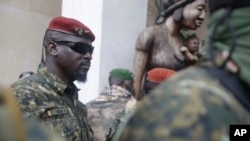After coming to power in a coup in 2021, the military rulers pledged to respect press freedom, Reporters Without Borders, also known by its French acronym RSF, said in a press release.
But since May this year, the restrictions imposed on non-official media have multiplied with social networks and private radio stations cut off, news websites interrupted or suspended and journalists assaulted or arrested.
In the most recent examples, the national media regulatory authority, the HAC, asked program provider Canal+ and pay-TV services platform StarTimes to withdraw some popular radio and TV channels until further notice.
It cited reasons of "national security", without giving further details.
These media outlets were unavailable in the country on Thursday.
Social networks such as WhatsApp, Facebook, Instagram and TikTok are also unavailable without a VPN (virtual private network), according to RSF.
"The lack of transparency in these decisions under the pretext of 'national security' is alarming, and discredits the supposed independence of the regulatory body," said Sadibou Marong, director of RSF's sub-Saharan Africa office, in a statement.
The RSF watchdog is demanding clear answers from the authorities and urges they do everything possible to restore access to censored media and social networks, he added.
The Guinean Press Professionals' Union, SPPG, and other press associations last week declared several government figures, including the prime minister, to be "enemies of the press," warning that independent media is "threatened with extinction" in the country.
In October, the security forces arrested a dozen journalists and used tear gas to disperse a demonstration to unblock the news website Guinee Matin, which has a large following.
Guinea ranks 85th out of 180 countries in the world press freedom index published by RSF in 2023.

Forum